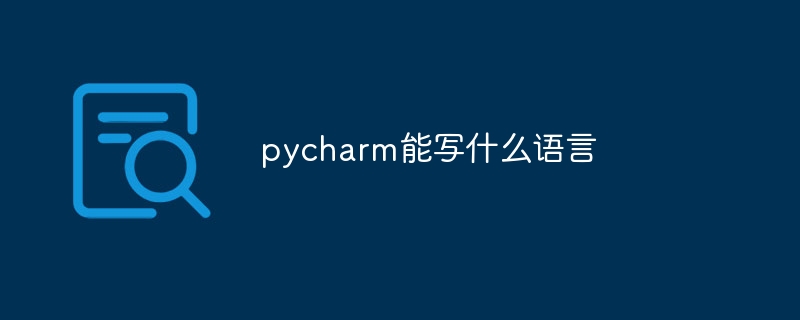What languages can pycharm write?
PyCharm can be written in languages including Python, HTML/CSS, JavaScript, Node.js, Django, Flask, Angular, React, Vue.js, SQL, Git, Markdown. Reasons why it supports these languages: syntax highlighting, auto-completion, error checking, refactoring tools, version control integration, customization options.

Languages that can be written in PyCharm
PyCharm is a popular integrated development environment (IDE) that For Python programming. However, PyCharm is not limited to writing Python code, it also supports a variety of other programming languages, making it ideal for multi-language developers.
Other languages you can write in PyCharm:
- HTML and CSS: Languages used to build and design websites.
- JavaScript: A scripting language used to create interactive web applications.
- CoffeeScript: A syntactically simpler language that compiles to JavaScript.
- TypeScript: A compiled language that extends JavaScript to provide type checking and object-oriented programming capabilities.
- Node.js: A runtime environment for writing server-side JavaScript applications.
- Django: A Python framework for building web applications.
- Flask: Another lightweight Python web framework.
- Angular: A front-end framework for building single-page web applications.
- React: Another popular front-end framework for creating user interfaces.
- Vue.js: A progressive framework for building interactive web applications.
- SQL: A language used to interact with databases.
- Git: A version control system used to track code changes.
- Markdown: A lightweight markup language for creating formatted text.
Why use PyCharm to write these languages?
PyCharm provides powerful support for these languages, including:
- Syntax highlighting and auto-completion: Helps write code easier, more acurrate.
- Error checking and debugging tools: Help find and fix problems in your code.
- Refactoring tools: Used to safely rename and move code elements.
- Version Control Integration: Allows easy management of code changes.
- Custom tool windows and keyboard shortcuts: Used to personalize your development environment.
The above is the detailed content of What languages can pycharm write?. For more information, please follow other related articles on the PHP Chinese website!

Hot AI Tools

Undresser.AI Undress
AI-powered app for creating realistic nude photos

AI Clothes Remover
Online AI tool for removing clothes from photos.

Undress AI Tool
Undress images for free

Clothoff.io
AI clothes remover

AI Hentai Generator
Generate AI Hentai for free.

Hot Article

Hot Tools

Notepad++7.3.1
Easy-to-use and free code editor

SublimeText3 Chinese version
Chinese version, very easy to use

Zend Studio 13.0.1
Powerful PHP integrated development environment

Dreamweaver CS6
Visual web development tools

SublimeText3 Mac version
God-level code editing software (SublimeText3)

Hot Topics
 1359
1359
 52
52
 How to reference js file with vue.js
Apr 07, 2025 pm 11:27 PM
How to reference js file with vue.js
Apr 07, 2025 pm 11:27 PM
There are three ways to refer to JS files in Vue.js: directly specify the path using the <script> tag;; dynamic import using the mounted() lifecycle hook; and importing through the Vuex state management library.
 Vue realizes marquee/text scrolling effect
Apr 07, 2025 pm 10:51 PM
Vue realizes marquee/text scrolling effect
Apr 07, 2025 pm 10:51 PM
Implement marquee/text scrolling effects in Vue, using CSS animations or third-party libraries. This article introduces how to use CSS animation: create scroll text and wrap text with <div>. Define CSS animations and set overflow: hidden, width, and animation. Define keyframes, set transform: translateX() at the beginning and end of the animation. Adjust animation properties such as duration, scroll speed, and direction.
 What does it mean to lazy load vue?
Apr 07, 2025 pm 11:54 PM
What does it mean to lazy load vue?
Apr 07, 2025 pm 11:54 PM
In Vue.js, lazy loading allows components or resources to be loaded dynamically as needed, reducing initial page loading time and improving performance. The specific implementation method includes using <keep-alive> and <component is> components. It should be noted that lazy loading can cause FOUC (splash screen) issues and should be used only for components that need lazy loading to avoid unnecessary performance overhead.
 What does the vue component pass value mean?
Apr 07, 2025 pm 11:51 PM
What does the vue component pass value mean?
Apr 07, 2025 pm 11:51 PM
Vue component passing values is a mechanism for passing data and information between components. It can be implemented through properties (props) or events: Props: Declare the data to be received in the component and pass the data in the parent component. Events: Use the $emit method to trigger an event and listen to it in the parent component using the v-on directive.
 How to use bootstrap in vue
Apr 07, 2025 pm 11:33 PM
How to use bootstrap in vue
Apr 07, 2025 pm 11:33 PM
Using Bootstrap in Vue.js is divided into five steps: Install Bootstrap. Import Bootstrap in main.js. Use the Bootstrap component directly in the template. Optional: Custom style. Optional: Use plug-ins.
 How to return to previous page by vue
Apr 07, 2025 pm 11:30 PM
How to return to previous page by vue
Apr 07, 2025 pm 11:30 PM
Vue.js has four methods to return to the previous page: $router.go(-1)$router.back() uses <router-link to="/" component window.history.back(), and the method selection depends on the scene.
 How to use watch in vue
Apr 07, 2025 pm 11:36 PM
How to use watch in vue
Apr 07, 2025 pm 11:36 PM
The watch option in Vue.js allows developers to listen for changes in specific data. When the data changes, watch triggers a callback function to perform update views or other tasks. Its configuration options include immediate, which specifies whether to execute a callback immediately, and deep, which specifies whether to recursively listen to changes to objects or arrays.
 How to use vue to jump home page
Apr 07, 2025 pm 11:45 PM
How to use vue to jump home page
Apr 07, 2025 pm 11:45 PM
In Vue.js, you can jump to the home page through the router.push('/') method. The steps are as follows: introduce the Vue routing library; create a Vue router instance; configure the homepage routing; and jump to the homepage in the component.




